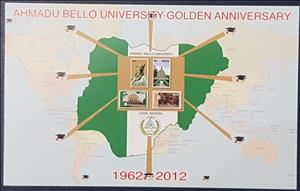Souvenir Sheet: Ahmadu Bello University Golden Anniversary (Nigeria 2012)
Ahmadu Bello University Golden Anniversary (Nigeria 2012)
24 November (Nigeria ) within release Ahmadu Bello University goes into circulation Souvenir Sheet Ahmadu Bello University Golden Anniversary face value 310 Nigerian naira
| Souvenir Sheet Ahmadu Bello University Golden Anniversary in catalogues | |
|---|---|
| Michel: | Mi: NG BL36 |
Souvenir Sheet is square format.
Also in the issue Ahmadu Bello University:
- Stamp - Ahmadu Bello University Crest - perf 13 face value 90;
- Stamp - Shika brown chickens - perf 13 face value 120;
- Stamp - Ahmadu Bello - perf 13 face value 50;
- Stamp - Ahmadu Bello University - perf 13 face value 50;
- Stamp - Ahmadu Bello University - perf 14 x 13½ face value 50;
- Stamp - Ahmadu Bello University Crest - perf 13½ x 14 face value 90;
- Stamp - Shika brown chickens - perf 14 x 13½ face value 120;
- Stamp - Ahmadu Bello - perf 13½ x 14 face value 50;
- Souvenir Sheet - Ahmadu Bello University Golden Anniversary face value 310;
Souvenir Sheet Ahmadu Bello University Golden Anniversary it reflects the thematic directions:
An anniversary is the date on which an event took place or an institution was founded in a previous year, and may also refer to the commemoration or celebration of that event. For example, the first event is the initial occurrence or, if planned, the inaugural of the event. One year later would be the first anniversary of that event. The word was first used for Catholic feasts to commemorate saints. Most countries celebrate national anniversaries, typically called national days. These could be the date of independence of the nation or the adoption of a new constitution or form of government. The important dates in a sitting monarch's reign may also be commemorated, an event often referred to as a "Jubilee".
A building or edifice is a structure with a roof and walls standing more or less permanently in one place, such as a house or factory. Buildings come in a variety of sizes, shapes and functions, and have been adapted throughout history for a wide number of factors, from building materials available, to weather conditions, to land prices, ground conditions, specific uses and aesthetic reasons. Buildings serve several needs of society – primarily as shelter from weather, security, living space, privacy, to store belongings, and to comfortably live and work. A building as a shelter represents a physical division of the human habitat (a place of comfort and safety) and the outside (a place that at times may be harsh and harmful).
Biologically, a child (plural: children) is a human being between the stages of birth and puberty. The legal definition of child generally refers to a minor, otherwise known as a person younger than the age of majority. Child may also describe a relationship with a parent (such as sons and daughters of any age) or, metaphorically, an authority figure, or signify group membership in a clan, tribe, or religion; it can also signify being strongly affected by a specific time, place, or circumstance, as in "a child of nature" or "a child of the Sixties". There are many social issues that affect children, such as childhood education, bullying, child poverty, dysfunctional families, child labor, hunger, and child homelessness. Children can be raised by parents, by fosterers, guardians or partially raised in a day care center.
Famous People refers to the fame and public attention accorded by the mass media to individuals or groups or, occasionally, animals, but is usually applied to the persons or groups of people (celebrity couples, families, etc.) themselves who receive such a status of fame and attention. Celebrity status is often associated with wealth (commonly referred to as fame and fortune), while fame often provides opportunities to make money.
A flag is a piece of fabric (most often rectangular or quadrilateral) with a distinctive design that is used as a symbol, as a signaling device, or as decoration. The term flag is also used to refer to the graphic design employed, and flags have since evolved into a general tool for rudimentary signalling and identification, especially in environments where communication is similarly challenging (such as the maritime environment where semaphore is used). National flags are patriotic symbols with varied wide-ranging interpretations, often including strong military associations due to their original and ongoing military uses. Flags are also used in messaging, advertising, or for other decorative purposes. The study of flags is known as vexillology, from the Latin word vexillum, meaning flag or banner.
A map is a symbolic depiction emphasizing relationships between elements of some space, such as objects, regions, or themes. Many maps are static, fixed to paper or some other durable medium, while others are dynamic or interactive. Although most commonly used to depict geography, maps may represent any space, real or imagined, without regard to context or scale, such as in brain mapping, DNA mapping, or computer network topology mapping. The space being mapped may be two dimensional, such as the surface of the earth, three dimensional, such as the interior of the earth, or even more abstract spaces of any dimension, such as arise in modeling phenomena having many independent variables. Although the earliest maps known are of the heavens, geographic maps of territory have a very long tradition and exist from ancient times. The word "map" comes from the medieval Latin Mappa mundi, wherein mappa meant napkin or cloth and mundi the world. Thus, "map" became the shortened term referring to a two-dimensional representation of the surface of the world.
A university (from Latin universitas 'a whole') is an institution of higher (or tertiary) education and research which awards academic degrees in several academic disciplines. University is derived from the Latin phrase universitas magistrorum et scholarium, which roughly means "community of teachers and scholars". Universities typically offer both undergraduate and postgraduate programs.







